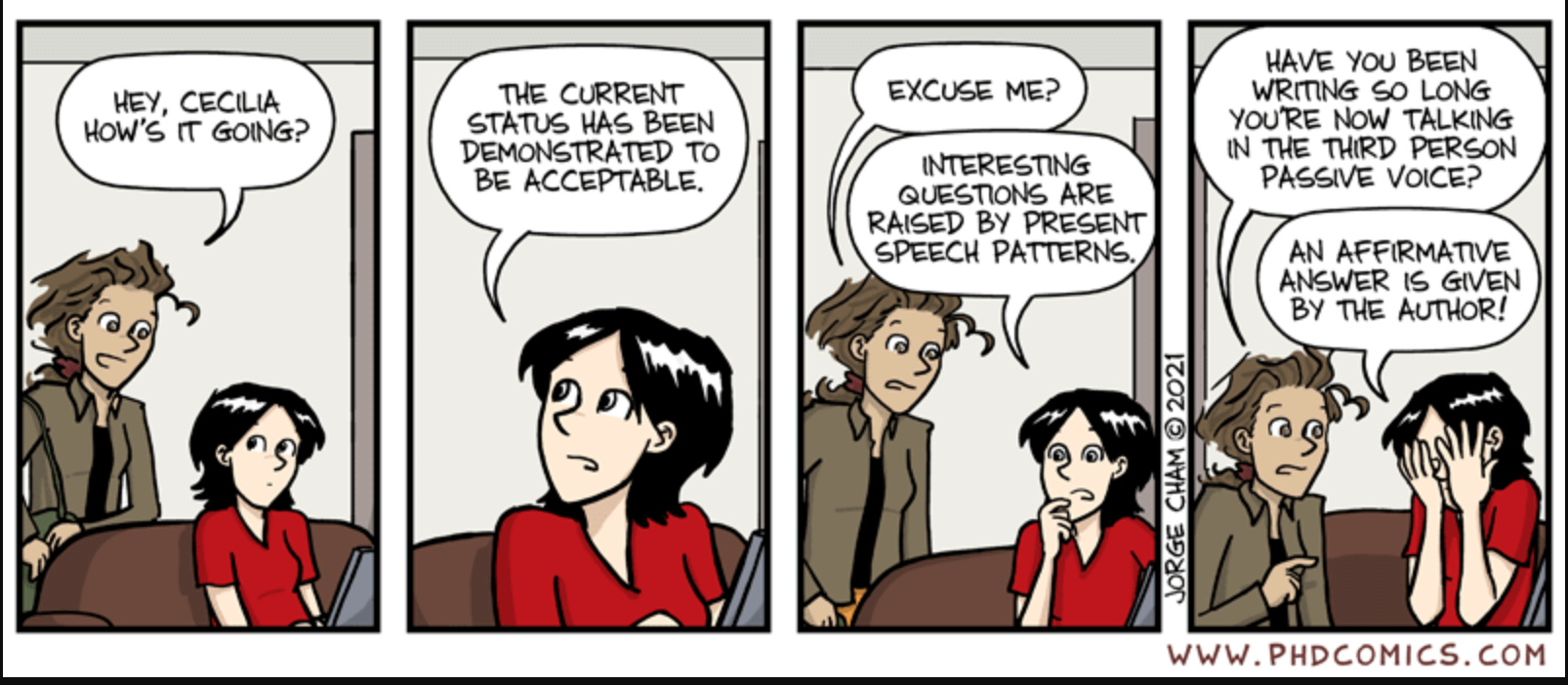"This intro is high-key gonna slap"
« previous post | next post »
The winning submission to a high school essay contest, written by Mallory Valis, described as "a 16-year-old from Toronto", starts this way:
Bro, this intro is high-key gonna slap. Just let me cook.
Oh wait, I should be more formal.
Uhh. . . . Henceforth I commence my righteous thesis. Yeah.
In the eyes of older generations, Gen-Z slang besmirches the Sacred English Language™ with its base, loose, and astonishingly convoluted wordplay. By now, you’ve heard it before. Words sprouting like weeds in conversations with friends or wriggling through Instagram comment sections: rizz, fit check, girlboss, slay, simp. . . the list spirals downwards into a pit of sacrilege.
And for a (more explicitly) old-person-oriented article on the same topic, see "Quiz: Do You Speak 2024?", NYT 12/24/2024.
You should read Mallory Valis' whole essay, but its opening reminded me of this PhD Comics strip:
And with a similar style shift, Samantha Hancox-Li promoted her Foreign Policy article "Get Ready for Trump’s TV Government (The incoming administration will be chaotic and personalist, not organized autocracy)" with a skeet reading
oh hey it ya girl explaining why the recent government shutdown extravaganza is just a preview of the next four years of GORILLA CHANNEL GOVERNANCE

Philip Taylor said,
December 27, 2024 @ 3:01 pm
I thought that the hyperlink from "skeet" in "with a skeet reading" would take me to somewhere explaining what a "skeet reading" (or even what "skeet") was — sadly I was disappointed. It took me instead to a page hosted by "bsky" which appeared to contain exactly the same content as appeared in the original post following the words "a skeet reading". And asking Google what a "skeet reading" was also failed to shed any light on the matter, so I am no wiser than I was at the outset.
altissima said,
December 27, 2024 @ 3:19 pm
https://en.wikipedia.org/wiki/Skeet (disambiguation page):
first item under "other uses":
"Skeet, slang name for a post and verb for making a post on Bluesky"
I suppose it's related to "tweet" for a post on Twitter.
Philip Taylor said,
December 27, 2024 @ 5:08 pm
Fair enough, so a "skeet" is a tweet posted on Bluesky. But what is a "skeet reading" ?
Phillip Helbig said,
December 27, 2024 @ 5:35 pm
OK, now you know what a skeet is. But here,“reading” is not a gerund, but a participle. On other words, a “skeat which reads” followed by the text of said skeet.
Philip Taylor said,
December 27, 2024 @ 6:22 pm
Ah, "a skeet which read" (or "which reads") — now I understand. Thank you both.
Mike Anderson said,
December 27, 2024 @ 10:40 pm
The first rule of Fashion is "Don't be boring."
By the second comment, I was already bored.
Coby said,
December 28, 2024 @ 1:32 pm
@ Philip Helbig: "not a gerund, but a participle."
According to the Cambridge Grammar (Huddleston & Pullum) there is only a gerund-participle.
Andrew Usher said,
December 28, 2024 @ 6:29 pm
In this case that might actually be useful. Normally it's pointless because, even though the two are the same morphologically, they have clearly distinct functions: the gerund is fully a noun, the participle (less than fully) an adjective. But here, which is it? I don't remember learning about this case specifically.
If it were the skeet doing the reading, it would obviously be a participle. In what Philip Helbig was presumably alluding to, a "skeet reading" (= a reading by skeet), we'd have a gerund. Here the function is adjectival, but the skeet is grammatically being read; I would call this, I suppose, a _passive_ present participle, though that description doesn't seem to be standard.
k_over_hbarc at yahoo.cpm
ktschwarz said,
December 29, 2024 @ 1:26 pm
The participle in a skeet reading is grammatically active, as is obvious in the equivalent "a skeet which reads". This is a standard sense of "read", found in all dictionaries. Don't confuse the semantics (a skeet is inanimate and not an agent) with the grammar.
Philip Taylor said,
December 29, 2024 @ 1:39 pm
Not clear to whom your comment is address, KTS, but if it is addressed (at least in part) to me, then I would note that not for one second did I think that a skeet was animate — I thought that a "skeet reading" (of which I had never heard) was perhaps analogous to (an instance of) "skat singing".
Andrew Usher said,
December 29, 2024 @ 3:07 pm
The reply was addressed to me, I'm sure, who also did not entertain the notion of a 'skeet' being animate or an agent. Yes, your meaning would also be a gerund: anything with 'reading' a noun modified by 'skeet' is.
As to the content: I don't think I was purely misled by semantics. The alternative a skeet which reads simply seemed ungrammatical to me, so I passed over it. First, it uses which in place of that; as that;s not relevant here, I'll make the correction. But "[text] that reads" isn't really grammatical for me in that sense either; I'd nearly always use "[text] reading", and the other would feel like an error and I assume I'd 'correct' it in typing.
But I do have and accept the ergative use where the participle is not allowable. Synonymous are "You've received a message. It reads …" and "You've received a message reading …" but "a message that reads" seems on reflection like a hybrid of those two, much like the grating, illogical second to last, which should of course be second-last or next to last.
In any case the essence of your correction of me seems persuasive, and possibly the English present participle can't be used in a truly passive sense.